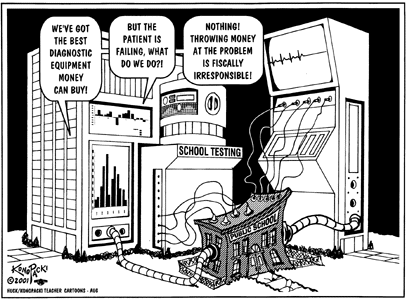 |
| Huck/Konopacki Labor Cartoons |
3 Easy Tricks to Maximize Profits
From the Public Sector
1. Demand low taxes to increase personal
income while decimating school budgets, thus making public education look like
a disaster in need of corporate management
2. Claim your private enterprise will
solve these problems and should be funded with public tax dollars (e.g.,
charter schools, Common Core Standards, laptops for every child, new textbooks
or ebooks, tutoring services, etc.)
3. Insist that teachers’ unions are the
main impediment to reform and lobby to have them weakened, eviscerated or
outright banned
All of the
above have been on the table for years at Los Angeles Unified School District
(LAUSD), one of the 176
California school districts currently at risk of going bankrupt. The
district’s budget deficit for the 2012-13 school year was projected to be $390
million as of 3/13/12, according to the LAUSD website.
There is no
question that record low tax rates combined with revenue losses due to the
housing market collapse have contributed to LAUSD’s budget woes, which in turn
have led district officials to attempt all sort of ludicrous shenanigans, like
asking teachers to take 20
furlough days (and consequently asking students to give up 20 days of
instructional time). The latest absurdity is Sup. Deasy’s plan to plug the nearly
$400 million dyke with a measly $25 million federal Race to the Top (RttT)
grant (see the Los Angeles Times).
For the
first time, RttT grants will be offered to individual school districts, and not
just states, willing to sell their souls for chump change. Aside from the fact
that the grant would only cover 6% of the current budget hole, the one-time grant
would expire at the end of the school year, leaving the district with the same
problem the following year unless it can increase its revenue stream or find
longer-term and bigger cuts.
There are
those who would argue that $25 million is better than nothing and in these dark
times one must take what one can get. However, one must consider what must be
sacrificed in order to get this “free” money before one can call it a good
deal.
Interestingly,
the state of California found the eligibility requirements for RttT so
burdensome that it voluntarily withdrew its grant proposal because the money
was too little for what was being asked. Unfortunately, it did not make this
realization until after it had already implemented some RttT requirements, like
adoption of Common
Core Standards (CCS), which are projected to cost the state more than $1
billion in new textbook and curriculum costs—far more than it would have
won in RttT grants.
One of the
biggest sticking points is that the state or local districts would need to get
union support before moving ahead, since RttT requires the use of student test
score data in teacher evaluations, something that cannot occur without changes
to teachers’ contracts. Some NEA and AFT locals around the nation have rolled
over and accepted this, despite the fact that the data is inconsistent and
often inaccurate even when used properly and, in many cases, it is not even
used properly (see here,
here
and here).
Consequently, many good teachers could be mischaracterized as ineffective and
possibly fired as a result, thus depriving students of good teachers. Worse, it
could drive many good teachers away from challenging lower income schools, or
from the profession entirely, thus worsening the problem evaluation reform
purports to fix.
No comments:
Post a Comment